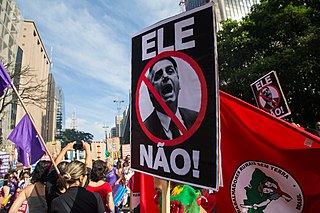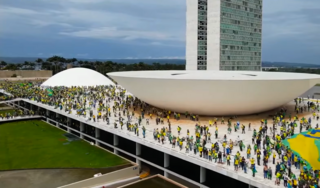
The Central Bank of Brazil is Brazil's central bank. It was established on Thursday, 31 December 1964, a New Year's Eve.

Lesbian, gay, bisexual and transgender (LGBT) rights in Brazil rank among the highest in the world.

Anti-discrimination laws in Brazil are present in the Constitution of Brazil, in the labour law, in the child and adolescent law, in the ageing law, and in the penal code.

The Ministry of Justice and Public Security, previously known as Ministry of Justice and Ministry of Justice and Citizenship, is a cabinet-level federal ministry in Brazil. The current minister is Flávio Dino.

In Brazil, the use of torture – either as a means of obtaining evidence through confession or as a form of punishment for prisoners – dates back to colonial times. A legacy of the Inquisition, torture never ceased to be applied in Brazil during the 322 years of the colonial period, nor later, during the 67 years of the Empire and the republican period.

Sergio Fernando Moro is a Brazilian jurist, former federal judge, college professor and politician. He was elected to be a member of the Federal Senate for Paraná in October 2022. In 2015 he gained national attention as one of the lead judges in Operation Car Wash, a criminal investigation into a high-profile corruption and bribery scandal involving government officials and business executives. Moro was also Minister of Justice and Public Security under the presidency of Jair Bolsonaro from 2019 to 2020.

Onyx Dornelles Lorenzoni is a Brazilian politician, businessman, and veterinarian. A member of the Liberal Party (PL), he is a federal deputy from Rio Grande do Sul in his fourth term. After the 2018 Brazilian general election, the president-elect Jair Bolsonaro invited Lorenzoni to be his Chief of Staff. He was also designated leader of the transition team.

The 56th Legislature of National Congress was a meeting of the legislative branch of the Federal Government of Brazil, composed by the Federal Senate and the Chamber of Deputies. It convened in Brasília on 1 February 2019, a month after the beginning of Jair Bolsonaro's only term as president, and ended on 31 January 2023.

Opinion polling has been regularly conducted in Brazil since the start of Jair Bolsonaro's four-year term administration, gauging public support for the President of Brazil and his government. Typically, an approval rating is based on responses to a poll in which a sample of people are asked to evaluate the overall administration of the current president. Participants might also be asked whether they approve of the way president handles his job, if they trust him, to rate his personality, or to opine on various policies promoted by the government.

The #EleNãomovement, also known as the protests against Jair Bolsonaro, were demonstrations led by women which took place in several regions of Brazil and, with less intensity, in other countries. The main goal was to protest against Jair Bolsonaro and his presidential campaign. The protests, which occurred on September 29, 2018, were the most numerous protests by women in Brazil and the largest popular concentration during the 2018 Brazilian general election.

André Luiz de Almeida Mendonça is a Brazilian attorney, Presbyterian pastor, and politician currently serving as Justice of the Supreme Federal Court. He is the third evangelical Christian positioned to join the top court, and former Minister of Justice and Public Security and Attorney General of the Union in the administration of President Jair Bolsonaro. Prior to assuming this role, he served as Attorney General of Brazil in the same administration.

The 2010 Acre referendum consisted of a decision regarding maintaining the time zone change for the Brazilian state of Acre, as the state had an 1-hour difference from Brasília Time (UTC-03:00) in 2008, when the original time zone had minus 2 hours from Brasília.

The 2021 Brazilian protests were popular demonstrations that took place in different regions of Brazil in the context of the COVID-19 pandemic. Protests both supporting and opposing the government happened.

Anderson Gustavo Torres is a Brazilian chief of police of the Federal Police, who served as Minister of Justice and Public Security under Jair Bolsonaro. Following the 2023 invasion of the Brazilian Congress, Torres' arrest was ordered by the Supreme Federal Court and he was subsequently arrested.

Daniel Tojeira Cara is a Brazilian educator, political scientist, and politician affiliated with the PSOL. He is a professor at the School of Education at the University of São Paulo and member of the Directive Committee of the National Campaign for the Right to Education, civil society network that he coordinated from 2006 to 2020.

Jair Bolsonaro and Hamilton Mourão inaugurated as 38th President of Brazil and 25th Vice President of Brazil, respectively, on 1 January 2019, in a ceremony held in the National Congress of Brazil in Brasília, beginning the presidency of Jair Bolsonaro.

The second presidency of Luiz Inácio Lula da Silva started on 1 January 2023, when he was inaugurated as the 39th President of Brazil. Lula was elected for a third term as President of Brazil on 30 October 2022, by obtaining 50.9% of the valid votes in the 2022 Brazilian general election, defeating incumbent Jair Bolsonaro. Lula is the first Brazilian president to ever be elected more than twice as well as he is the oldest person to ever be elected president in Brazil.

Luiz Inácio Lula da Silva and Geraldo Alckmin were inaugurated as 39th President of Brazil and 26th Vice President of Brazil, respectively, on 1 January 2023, in a ceremony held in the National Congress in Brasília, beginning the third Lula administration. At the age of 77, Lula became the oldest president-elect to assume office and the only president in Brazilian history to serve two non-consecutive terms in office through the democratic vote.

On 8 January 2023, following the defeat of then-president Jair Bolsonaro in the 2022 Brazilian general election, a mob of his supporters attacked Brazil's federal government buildings in the capital, Brasília. The mob invaded and vandalized the Supreme Federal Court, the National Congress building and the Planalto Presidential Palace in the Three Powers Plaza, seeking to violently overthrow the democratically elected president of Brazil Luiz Inácio Lula da Silva (Lula), who had been inaugurated on 1 January. Many rioters said their purpose was to spur military leaders to launch a coup d'état and disrupt the democratic transition of power. Neither Lula nor Bolsonaro were in Brasília at the time of the attack.

During the 2023 Brazilian Congress attack, numerous works of art were targeted by supporters of Brazilian former president Jair Bolsonaro.




















